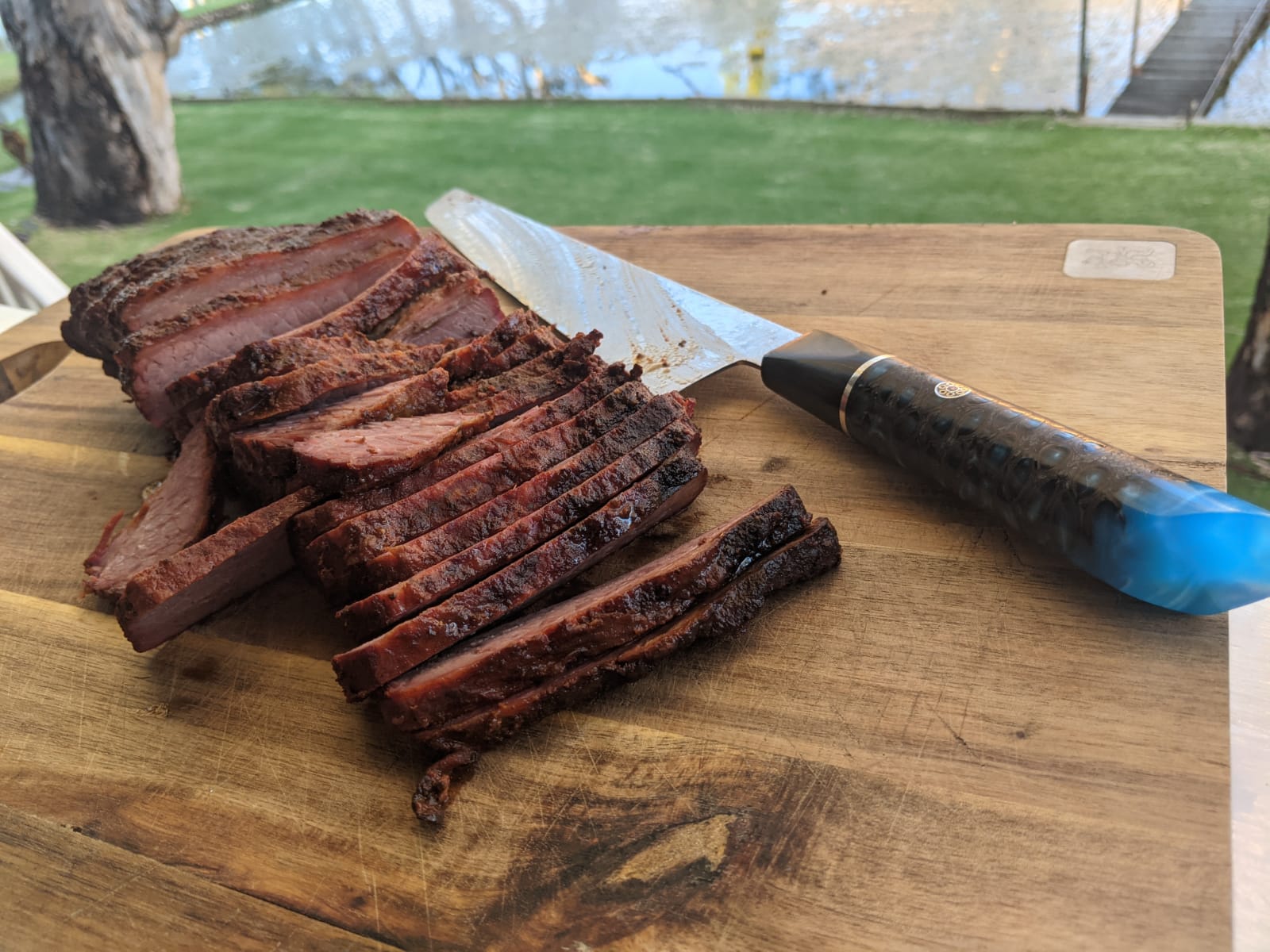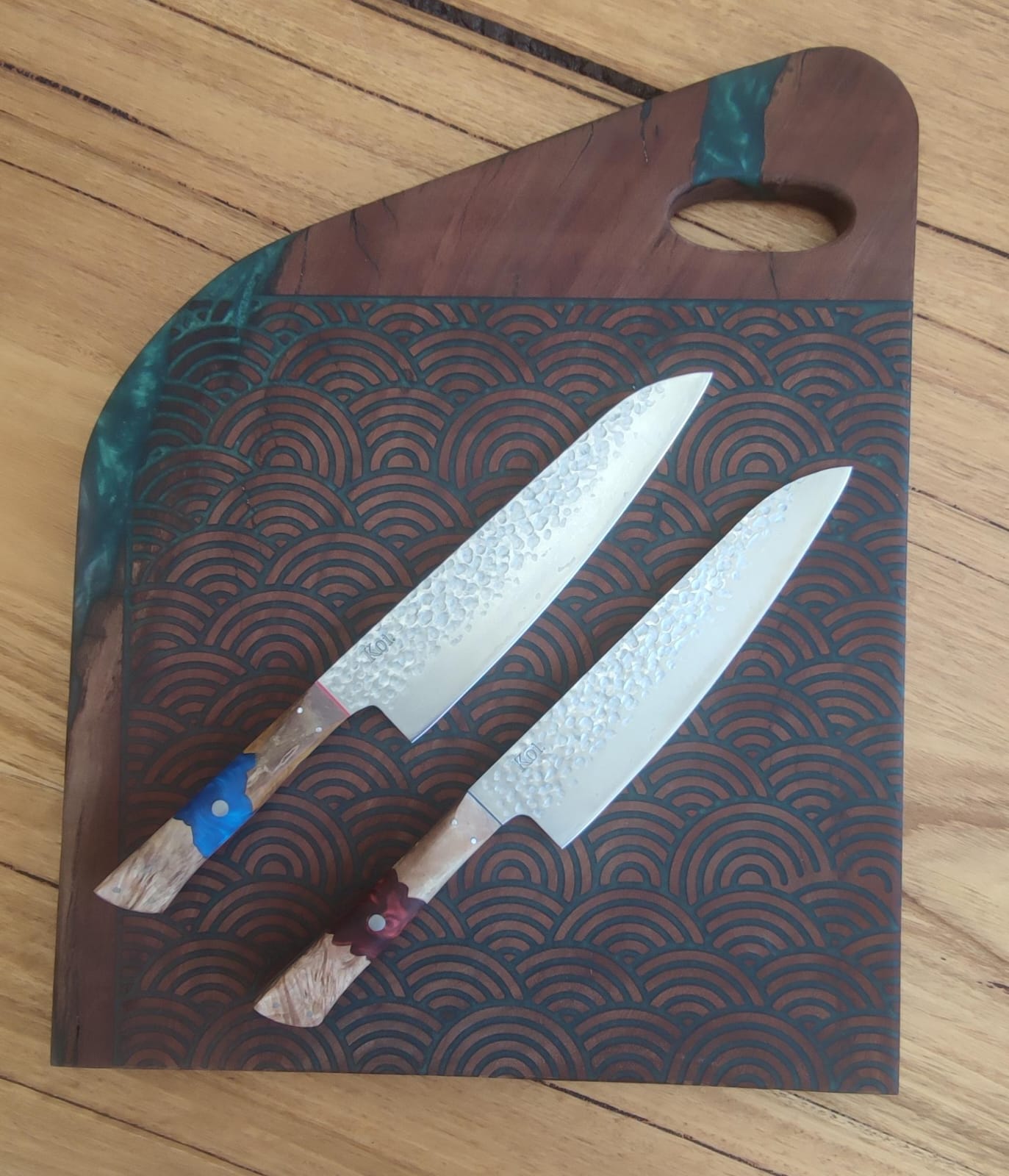There is something strangely satisfying about eating meat that you have smelled and watched being cooked all day. Cooking on coals in the outdoors takes a lot of thought, time and patience, so when you slice through and bite into that beautifully cooked piece of meat that you've been tending to throughout the day, there is not only a flavour sensation, but a great sense of appreciation and achievement.

While visiting one of Adelaide's iconic holiday spots by the River Murray recently, the Koi Knives team had the pleasure of enjoying and slicing through an eight hour slow cooked smoked beef brisket. Our Japanese knives had the honour of carving through the superbly smoked beef that tenderly fell apart as our sujihiki knife gracefully glided through each slice with ease. Here we bring you the process for this glorious Riverside Beef Brisket.

The frontier smoker was fired up first thing in the morning. Good quality charcoal is essential. First you place the charcoal in the charcoal bucket to concentrate the heat. You want the charcoal to turn white, which takes about 20-30 minutes. The charcoal is then tipped into the charcoal bed rack and spread out evenly. A water tray is placed above to create humidity in the smoker which prevents the meat from drying out.
Using a high-quality piece of meat is also important. Our friends at Meat at Billy's would agree that its best to see your local butcher to ensure you get a top shelf cut of beef. The meat was prepared in a premixed Texas barbecue dry rub after being coated in olive oil. The meat was left in the oil and rub for about an hour before being placed into the smoker.

The optimum temperature inside the smoker is 120C (250F). We used a probe thermometer inserted inside the brisket. When the temperature reached 80C (175F) the meat was smeared in butter (everything tastes better in butter!) and wrapped in aluminium foil, which was about halfway through the cook. Hickory woodchips were added onto the coals from start to finish about every 30 minutes to smoke the brisket and give it a smokey hickory flavour.


All day long we eagerly waited for dinner to cook as the smokey, barbecue meaty aromas wafted through the air. As we waited, the Koi Knives family soaked up the riverside beauty and festivities. Located less than two hours from Adelaide, this Purnong river getaway was a little piece of paradise. Being just after Christmas, the riverbank was a hive of activity, with every holiday shack lining the river occupied. It was a busy day on the water with speed boats, jet skis and house boats continually passing by. The younger family members spent the afternoon running in and out of the water, while the adults kept a close eye on the smoking meat and made sure they kept hydrated with a well stocked esky of beers.

After being tightly wrapped in the aluminium foil for about four hours, the meat was taken out and wrapped in a top layer of towel and placed inside an esky to rest for an hour. This enables the meat to cool slowly and ensure the meat stays juicy and tender.

The rested meat was then placed on a chopping board and sliced with our sujihiki knife with a banksia pod and sky blue handle. The Japanese sujihiki knife has a long blade which enables the meat to be sliced in one long stroke, rather than a sawing motion. Sawing pushes out the juices of the meat, causing the meat to dry out. Having the correct knife to carve your brisket is therefore an important consideration.


As the knife glided through the meat you could see the where the smoke had penetrated the meat which was visible in the pink smoke ring. The brisket was accompanied with coleslaw and brioche buns, with the option to make your own beef slides, and sides on barbecued corn and jalapeño poppers.


Sitting back with a beef brisket slider, beer and great company against the back drop of the river and sun setting against the cliff, it was a very special, memorable and tasty moment. At Koi Knives, we love how a delicious meal brings family and friends together. Food nurtures our body while family and friends nurture our souls, and uniting these together makes for a very happy l




